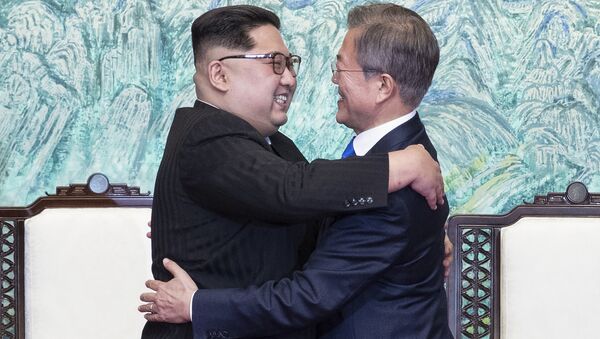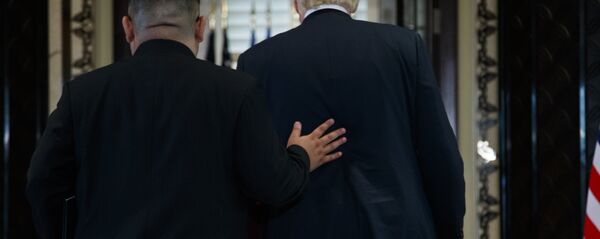A special envoy delegation sent by South Korean President Moon Jae In visited the North Korean capital of Pyongyang Wednesday, delivering a personal letter from Moon to Kim. A Thursday statement in the Workers Party of Korea's newspaper, Rodong Sinmun, described the photoshoot, dinner and discussions as taking place "in a compatriotic and warm atmosphere."
The Rodong Sinmun article says Kim was "pleased over the fact that technical contacts in various fields were made between the north and the south, the reunions of separated families and relatives were realized and north-south military talks and the work of setting up a joint liaison office progressed well after the historic Panmunjom meeting," and that "we should value all these successes which the north and the south made hand in hand and keep advancing without deviation the north-south ties that have definitely entered the new orbit of peace, the orbit of reconciliation and cooperation."
According to the statement, the two Korean delegations mostly discussed the agenda and schedule of the upcoming inter-Korean summit, to take place in Pyongyang September 18 to 20, and Kim said, "The north and the south should further their efforts to realize the denuclearization of the Korean Peninsula." Those efforts that have seemingly stalled in recent weeks as the US cancelled it most recent planned visit by Secretary of State Mike Pompeo, the US equivalent of a foreign minister, claiming not to have seen sufficient progress by North Korea toward denuclearization.
More details about the meeting came to light once the delegation returned to South Korea, when members of the envoy delivered further messages from Kim.
Chung Eui-yong, Moon's national security adviser, told reporters Thursday that Kim said he would be willing to sign the end-of-war declaration that Seoul and Pyongyang have been pursuing since the spring without concomitantly demanding the withdrawal of the 28,500 US troops stationed in South Korea or an end to the alliance between the US and South Korea.
While a lasting peace treaty to the 1950 to 1953 war would require much more extensive negotiations between the four powers involved — North Korea, China, South Korea and the US — a statement declaring the end of the war, issued by the two Koreas, would be an important step toward realizing that goal, which Moon and Kim have indicated to be their primary concern ever since their first meeting at the truce city of Panmunjom in April.
Rodong Sinmun articulated the belief Thursday that "[t]he US should no longer stick to a position of attaining denuclearization before signing a peace treaty."
"Chairman Kim Jong Un has made it clear several times that he is firmly committed to denuclearization and expressed frustration over skepticism in the international community over his commitment," Chung said. "He said he has pre-emptively taken steps necessary for denuclearization and wants to see these goodwill measures being met with goodwill measures."
Chung also told reporters that "Chairman Kim stressed that he has never spoken negatively about President Trump to his staff or anyone," a statement that won praise from US President Donald Trump in a tweet Thursday.
Kim Jong Un of North Korea proclaims “unwavering faith in President Trump.” Thank you to Chairman Kim. We will get it done together!
— Donald J. Trump (@realDonaldTrump) September 6, 2018
In turn, the US State Department announced Thursday that Stephen Biegun, the US' new special envoy to North Korea, who was supposed to go on Pompeo's cancelled visit, would be touring South Korea, China and Japan next week.
"The special representative will meet with his counterparts and continue diplomatic efforts to achieve the final, fully verified denuclearization of North Korea as agreed to by Chairman Kim in Singapore," it said, without further elaborating in Biegun's itinerary, the South China Morning Post reported Thursday.
The South Korean diplomat further affirmed the two Korean governments' commitment to opening a liaison office in the North Korean industrial city of Kaesong before the inter-Korean summit. Another goal of the Panmunjom summit, the South Korean Ministry of Unification announced last month the approval of $3.1 million in funding to set up the inter-Korean joint liaison office, to come from the Inter-Korean Cooperation Fund, NK News reported at the time.
"We will operate the liaison office with the aim that it can contribute to round-the-clock dialogue and cooperation and the stable management of the situation of inter-Korean relations," the unification ministry said in the statement.
"The Ministry of Unification will strive to contribute to the development of the South-North relations by implementing the Panmunjom Declaration sector-by-sector without setbacks."
Meanwhile, North Korea is preparing to celebrate its 70th anniversary on Sunday, and there's no shortage of speculation and anticipation about how the festivities will play out.
Satellite photos on the website 38 North show that North Korean troops have been practicing for weeks at a mockup of Pyongyang's Kim Il Sung Square, named after the founder of the country (and Kim Jong Un's grandfather), a revolutionary communist leader who led the Korean insurgency against Japanese colonial rule during World War II. His Workers Party of Korea declared the foundation of the people's democratic republic on September 9, 1948, and the country has made a habit of celebrating its birthday with an extravagant parade, the centerpiece of which is typically their latest military weaponry.
However, observers wonder if this year's event won't be different, to reflect the change in tone by Kim in recent months. The last major military parade, in February, showcased North Korea's Hwasong-14 and Hwasong-15 intercontinental ballistic missiles, the very weapons at the center of the denuclearization push on the peninsula, which North Korea says are necessary to guarantee its security and independence amid the presence of US troops in the South and the lack of a permanent peace treaty.
In a major contrast to past parades, dozens of international media organizations have been granted visas to attend this year's events, Defense News noted Thursday.
It's known that the parade, which always features mass performances by the people of the city, will include a torch parade as well as the revival of the country's iconic mass games after a six-year hiatus. The celebrations also feature civilian contingents celebrating achievements in agriculture, industry, science and art, and may feature these more prominently in the past, given Kim's newly declared focus on building these parts of North Korean society.





